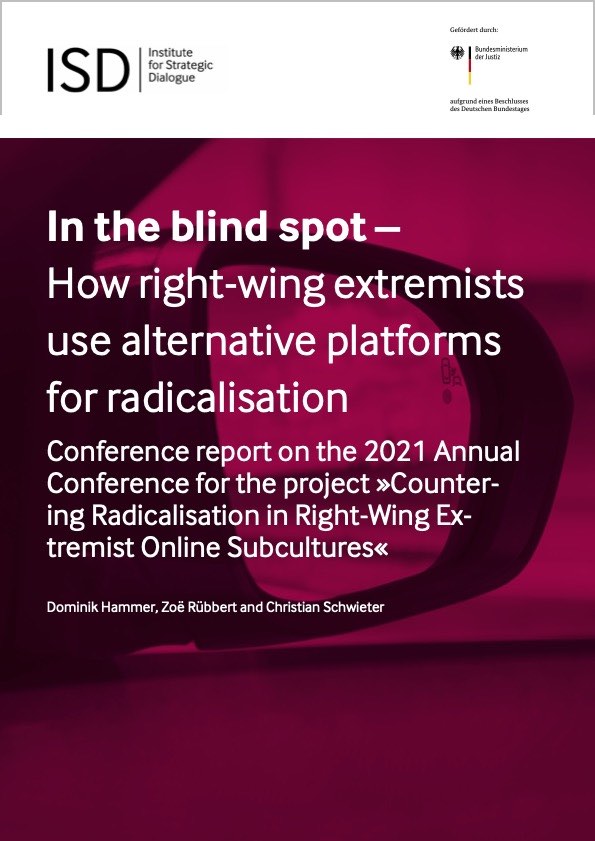In the Blind Spot – How right-wing extremists use alternative platforms for radicalisation

Authors: Dominik Hammer, Zoë Rübbert & Christian Schwieter
Published: 24 October 2022
This report provides a summary of the expert conference “Im toten Winkel – Wie Rechtsextreme alternative Online-Plattformen zur Radikalisierung nutzen” (In the blind spot – How right-wing extremists use alternative online platforms for radicalisation), which was held as part of the project “Countering radicalisation in right-wing extremist online subcultures” funded by the German Federal Ministry of Justice (BMJ). The first annual conference of the project took place from 25 to 26 November 2021 in Berlin as a hybrid event. In addition to the approximately 50 participants who were present at the conference venue, invited guests were also able to follow the event via a closed livestream. The conference served to present current research projects from digital right-wing extremism research and to discuss diverse perspectives from research, regulation and law enforcement.
The social and political relevance of the research field as well as current trends in right-wing extremism research were discussed in keynote speeches held by the former State Secretary of the Federal Ministry of Justice, Prof. Dr. Christian Kastrop, the Executive Director of ISD Germany, Huberta von Voss, and ISD Senior Research Fellow Julia Ebner. The conference was divided into several panels, which addressed topics such as platform-specific research and cross-ideological networking, the role of gaming communities and anti-feminist subcultures in right-wing extremist radicalisation, theory, methodology and research ethics, and possible measures and regulatory approaches on alternative online platforms. Furthermore, there was a thematic presentation on the challenges and opportunities of cross-platform research and on combating hate speech from the perspective of law enforcement.
While the first annual conference of the project “Countering Radicalisation in Right-wing Extremist Online Subcultures” was deliberately broad in scope and offered a forum for diverse approaches and voices from different disciplines, a consensus quickly emerged on individual topics. In this conference report, the conference proceedings and the contributions of the participants are summarised to enable insights into the central discussions on the conference.
Dominik Hammer is a Research Manager at ISD Germany. He works on analysing radical right-wing and right-wing extremist activities online. His work focuses on democratic theory, strengthening democratic practice, and analysing antidemocratic movements. Before joining ISD Germany, Dominik Hammer was a university researcher and instructor and was involved in adult education. He is co-author of the ISD research reports Escape Routes, Signposts, Telegram as a Buttress , Detours and Diversions, and Auf Odysee.
Zoë Rübbert is a trainee at ISD Germany, where she is involved with the research project “Countering Radicalisation in Right-Wing Extremist Online Subcultures”. She is also a member of the Business Council for Democracy, which aims to impart digital civil culture through adult education. She previously studied International Relations at the University of Leiden, and completed her studies with a Bachelor of Science.
Christian Schwieter is a Project Manager at ISD Germany, leading the German-language research project on far-right activity on alternative and emerging online platforms. At ISD, Christian also co-led the pilot phase of the Digital Policy Lab, a new intergovernmental working group focused on charting the online policy path forward to prevent and counter disinformation, hate speech and extremism. Previously, Christian worked as a researcher for the Computational Propaganda Project at the Oxford Internet Institute, where he co-authored reports on state-backed information operations relating to the Covid-19 pandemic. In 2019, Christian was the Specialist Adviser on Disinformation Matters for the UK Digital, Culture, Media and Sports Select Committee at the House of Commons. Christian holds an MSc in Social Science of the Internet from the University of Oxford and a BA from Leiden University College The Hague. He is co-author of the ISD research reports Deutschland und der angebliche Klimalockdown, Telegram as a Buttress and Detours and Diversions and Auf Odysee.
Editorial responsibility: Huberta von Voss, Executive Director ISD Germany
This report was produced as part of the project “Countering radicalisation in right-wing extremist online subcultures” funded by the Federal Ministry of Justice (BMJ). The responsibility for the content lies exclusively with ISD Germany.
“In the blind spot” was first published in German as “Im toten Winkel – Konferenzbericht zur Jahreskonferenz 2021” on 29 April 2022
